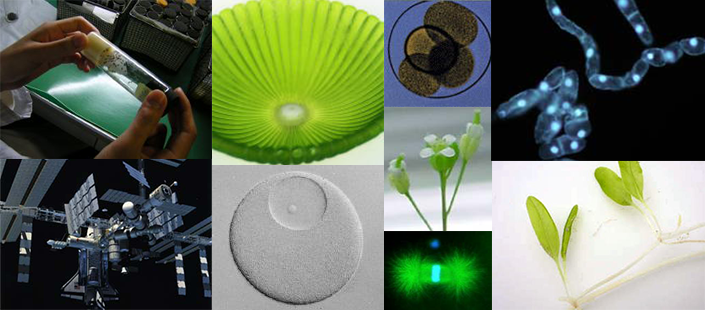- Top
- Biology
ページの本文です。

Biology
Biology
Mysterious and Beautiful Principles at Work
Unveil the Mechanisms of Life in an Advanced Research Environment
Biology is a discipline that researches a wide variety of complex organisms from microbes to humans, along with a diverse range of biological phenomena.
Biology has made dramatic advances in recent years in areas such as molecular biology. As we have come to understand in concrete terms what is happening in the previously mysterious realm of life, it has sparked our interest in other issues that surround life as well, including the environment (both in space and on Earth) and our inner psychological worlds. Collaborations with other fields such as information science and chemistry are moving ahead, and this has only accelerated the trend.
In addition to medical science, pharmaceutical science, agriculture, information science and other related fields, the study of biology now extends its influence to social issues such as problems in the global environment and bioethics. Biology is a vital field that is developing many attractive and diverse research programs.
Objective: Develop Diversely Talented Individuals
Biological phenomena may appear mysterious, but they conceal principles and logic so elegant as to be beautiful. Not only is biology about systematically studying living organisms—which represent one of the “last treasure troves” of the twenty-first century—it also provides students with an opportunity to participate in cutting-edge research. Research covers a wide range of living subjects both at the microscopic level (such as genes) and the macroscopic level (such as individual animals and the environment).
Based on the principle that every student has individual talents, the Biology program provides comprehensive instruction with the goal of fostering individuality equipped with creativity, along with the sharp intuition and insight necessary to understand life at a deep level.
Eighty percent of graduates go on to graduate school, after which they work for corporations, national or public research institutes, universities and other organizations as researchers. Graduates find employment in a wide range of fields, including food, medicine, banking, think tanks, IT and teaching.
Features: Foster Practical Skills by Emphasizing Practical Training
The curricula of the first and second years of study use basic biology lectures and practical training to give students a core of knowledge, understanding, logic and experimental techniques. Third- and fourth-year students then acquire practical skills through specialized practical training and special research. This practical training covers a broad range of advanced subjects, including marine organisms and plants that can be viewed outside the classroom, small organisms and cells that can be viewed under the microscope, and genes and proteins at the molecular level. Each student has a microscope and works in a research environment with cutting-edge experimental equipment that is designed to foster their individual spirit of inquiry. Students can also lodge at the Marine and Coastal Research Center, where they can engage in practical training outdoors.
Faculty members in charge of biology education have extensive practical experience in research activities in each area of expertise. The Biology program provides lectures and practical training that showcase the continually advancing field of modern biology all the way to the frontlines. Students can participate in practical research in laboratories starting from their first year.
Evolutionary Biology
The goal of this course is to improve the student’s ability to understand and think about the mechanisms of evolution by applying key concepts of animal evolution to answer a wide range of “why” questions in biology. This course provides a foundation for all of biology.
Biological Chemistry
Cells are the units of activity of living organisms. To understand cell behavior at a molecular level, students acquire basic knowledge regarding the structure, properties and functions of the various biological macromolecules that make up cells.
Animal Physiology
This course deepens student understanding by describing the generation and propagation of action potentials related to animal senses and movements, muscle contraction and other phenomena from the perspectives of biophysics, cell biology and molecular biology.
Plant Systematics
Students acquire a deeper understanding of the diversity and origins of plants that generate oxygen through photosynthesis (both terrestrial plants and algae), along with basic knowledge regarding the morphological and physiological functions plants exhibit.
Basic Genetics
The goal of this course is to reach a deeper understanding of a variety of genetic phenomena, based on the workings of genes. To provide a foundation for understanding evolution, the course also touches on the behavior of genes as they exist in populations.
Laboratory Course of Biology III
This course serves as an entry point to the twenty options on the Ochanomizu biology practical training menu, through which biology students learn basic techniques and ways of thinking that are useful in advanced courses and practical training.







